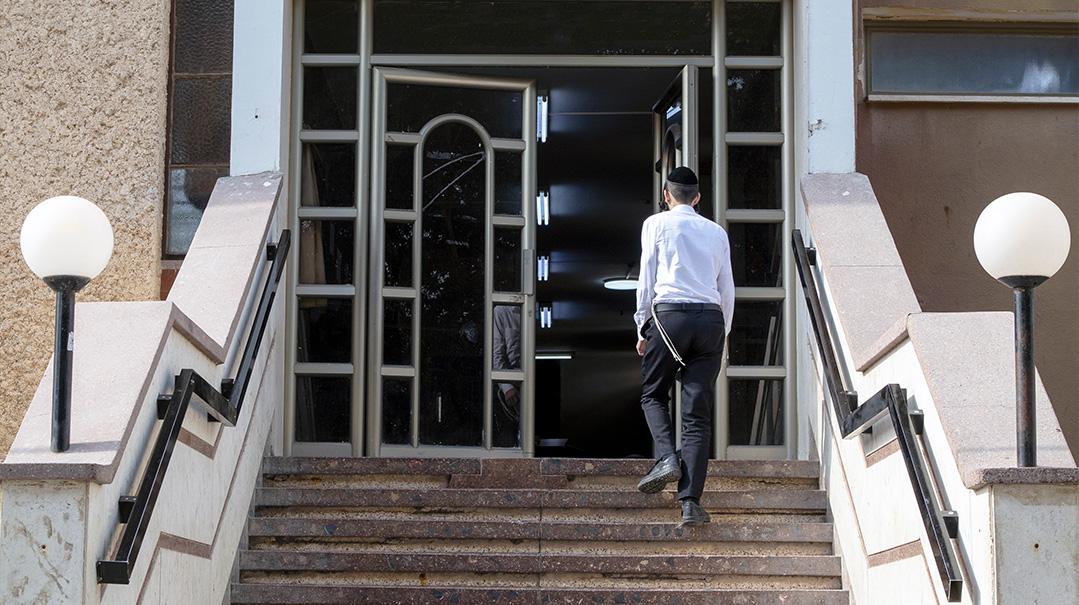Time to Rethink Learning Abroad
| April 2, 2024It is time to ponder whether or not it should be considered a luxury

Dear British Jewry,
Among our chief current challenges is a financial one: The communal infrastructure we all rely on is dangerously strapped for cash. We need well-functioning mosdos chinuch for our children and all the other crucial organizations that are part and parcel of kehillah life; but inflation has driven up their operating expenses, and we as a kehillah are struggling mightily with the dilemma facing the individuals who are unable to absorb the increased costs being passed along to them.
Tzedakah is an essential part of the answer, but we as a responsible kehillah must take another important avenue: reducing costs. The cost shops that some wonderful individuals have set up offer a prime example of this. They have largely offset the monthly increases in food prices.
It is in this vein that I bring up a delicate subject: Perhaps the moment has arrived to rethink the time our children spend learning in Eretz Yisrael.
I will preface this by saying that it is our fervent collective wish for our erliche Yiddishe children to learn and keep the Torah and mitzvos, and there is nothing like the Torah of Eretz Yisrael. The following is not intended to negate that in the slightest, chalilah. The intent is rather to consider whether the circumstances Hashem has created necessitate that we regretfully implement change.
At present, most litvishe families will, once their children hit their late teens, need to pay the equivalent of an entire year’s salary to support their sons and married children learning in Eretz Yisrael (or America). There will often be at least two children in this age bracket, and this stage will generally last at least ten years!
This situation crept upon us slowly. There was no single defining moment that alerted us to the change and forced us to stand back and reassess. Perhaps that time is now?
A combination of factors — yeshivos charging fees, the weak pound, exorbitant rental increases — have made the cost astronomical. It is now in an entirely different ballpark from when this practice first began. It is time to ponder whether or not it should be considered a luxury.
In many families, the cost reaches beyond the capacities of both parents working full time. It necessitates taking on additional jobs outside nine-to-five hours. The pressure of parents working themselves literally ragged to pay for this, leaving little money for any other very necessary expenses in their families — e.g., crucial tutoring or assistance for the younger children — is already showing its mark. And it also drives these families to seek to “get away” with paying the minimum possible school fees. We are self-combusting.
When it’s not a minority but a very decided majority that is not managing, then it’s time for change.
Some new yeshivos gedolos have recently started in the UK, and Gateshead has a new kollel for newlyweds. Perhaps it’s time to assess whether this should become the norm rather than the exception. (Please note that this is already the case in the United States.)
WE have many outstanding talmidei chachamim in the UK who could even travel to other towns to give shiur if necessary. Yeshivah fees would be at least 50 percent less than what parents are paying abroad. And for young kollel couples starting out, the wife could get a decent job in the UK. Parents could pay a quarter of what they would have given the couple annually. With these cost reduction factors in place, it could possibly free these kollelim from paying for the first two or three years — which in turn would mean no additional financial needs being passed on to the kehillah (aside from financing premises and faculty).
We as a kehillah could take other steps to keep Toras Eretz Yisrael from becoming totally out of reach. Perhaps bochurim could go for shorter periods of time — e.g., a year, or a zeman; or they could have extended Yarchei Kallahs in Eretz Yisrael, in conjunction with their UK yeshivos and kollelim.
Let’s make no mistakes — this issue is not exclusive only to those with children in the relevant age groups. Apart from the fact that many have children who will eventually reach this age group, the reality is that when a large segment of the kehillah is fiscally stretched and utterly overworked, it does not create the workings of a healthy society.
A serious rethink is called for some carefully considered changes. Something that can’t continue won’t. When a system or practice slowly peters out, there are many casualties and it is so much more painful for all involved. Can we as rachmanim not rather consider if this move needs to be taken?
Talk about this. Put it on the agenda. Talk to people with children in the relevant age groups, clue yourself in on the figures involved. You will likely be shocked. Involve people who can help. Collaborate. Think of solutions. Present those ideas to rabbanim to ask their advice.
Looking forward to change,
A Mancunian
(Originally featured in Mishpacha, Issue 1006)
Oops! We could not locate your form.







